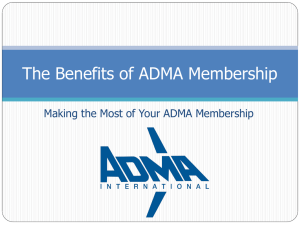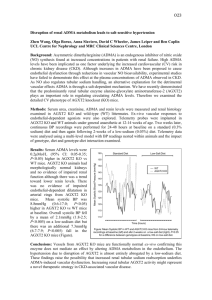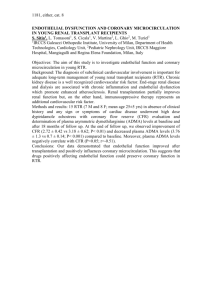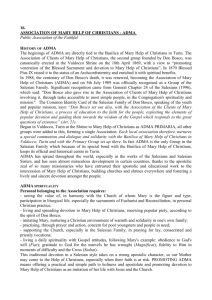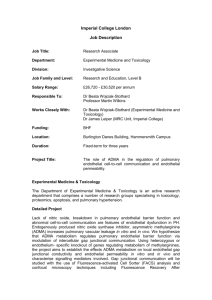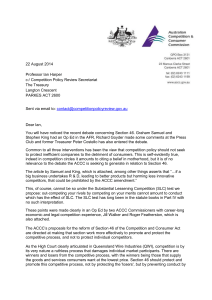Submission - Robin Whittle
advertisement
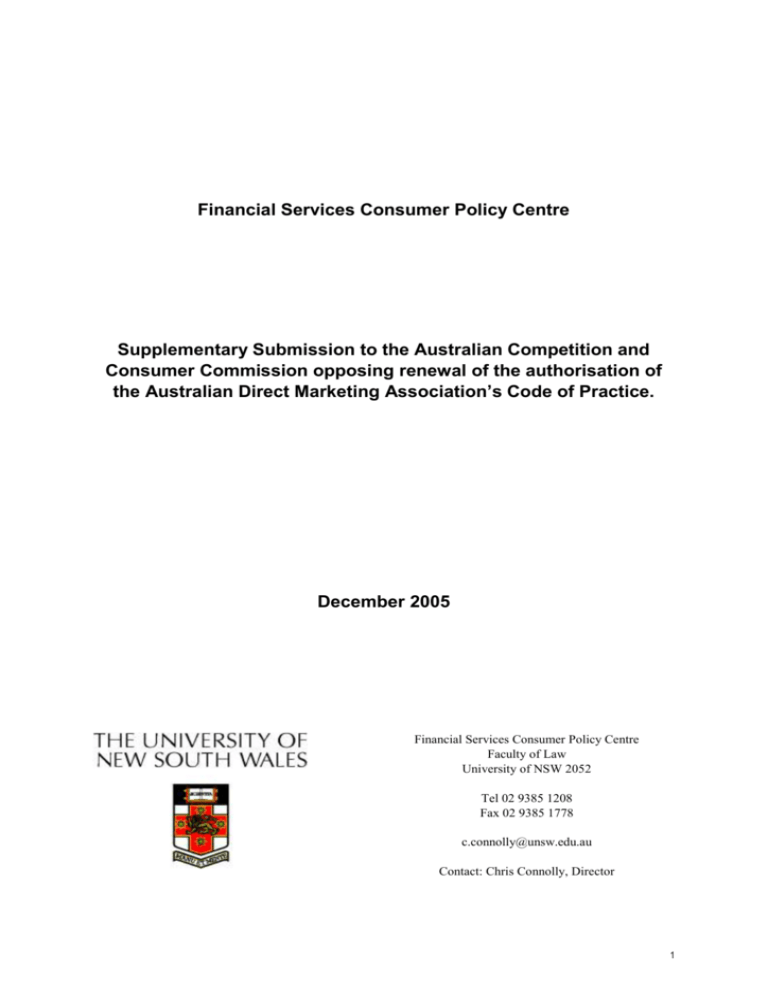
Financial Services Consumer Policy Centre Supplementary Submission to the Australian Competition and Consumer Commission opposing renewal of the authorisation of the Australian Direct Marketing Association’s Code of Practice. December 2005 Financial Services Consumer Policy Centre Faculty of Law University of NSW 2052 Tel 02 9385 1208 Fax 02 9385 1778 c.connolly@unsw.edu.au Contact: Chris Connolly, Director 1 1. Overview The Financial Services Consumer Policy Centre submits that the ACCC should refuse the current request for authorisation. We conclude that no public benefit can be gained from authorising the ADMA Code. As usual, there have been some improvements to the content of the Code in this draft. However, these are only as a result of the recommendations of third parties and updates to the law in some jurisdictions, and not through the good will or leadership of ADMA. In any case, the majority of these amendments appear to simply reflect State legislation. As always, ADMA is “catching up” with existing regulation rather than delivering any additional public benefit through the Code. This has been a consistent pattern for the entire history of the Code. These additions do nothing to address our core concerns with the Code: — Coverage We have consistently argued that ADMA does not have sufficient coverage of the telemarketing sector, and that indeed ADMA is the wrong industry body for coverage of telemarketing. Despite six years of requests the ACCC has never undertaken an independent evaluation of ADMA’s market share of telemarketing in Australia. — Complaints and Code Authority The dismal level of public awareness of ADMA, the Code and the Code Authority continues to be reflected in the low level of complaints considered by the Code Authority. — Do Not Call register An alternative regulatory mechanism for telemarketing has emerged – the proposed national do not call register. This development makes the ADMA Code entirely irrelevant in relation to telemarketing and telemarketing should now be removed from the ACCC’s consideration of the ADMA Code. FSCPC opposes renewal of the authorisation. The Code does have both a real and potential impact on competition, and delivers no tangible benefits to consumers. The Code fails the “net public benefit” test in the Trade Practices Act. 1 2. History The Australian Direct Marketing Association Code of Practice has been consistently opposed by privacy and consumer groups since it was first proposed in 1998. It has since been held up as an example of the failure of self regulation in numerous articles, forums, committees and Parliamentary debates. The Financial Services Consumer Policy Centre (FSCPC) opposed the ACCC’s 1999 decision to authorise the Code, warning that: — ADMA lacked sufficient market coverage in telemarketing and spam; — The Code lowered, rather than raised, the standard of consumer protection in direct marketing; — The Code entrenched privacy intrusive practices in telemarketing and spam which were unacceptable to the public; — The Code lacked sufficient enforcement, monitoring and review mechanisms; and — ACCC authorisation would be misconstrued as ACCC ‘approval’ of the type of business conduct permitted under the Code. FSCPC stands by these warnings and believes that the last six years have demonstrated their accuracy. This submission elaborates on each of these issues in the sections below. We note that there is still no consumer or privacy organisation that supports the ADMA Code. In contrast, privacy and consumer organisations have thrown their support behind the proposed national do not call register. 2 3. Competition aspects of the Code Non-membership of ADMA may place a direct marketing company at a commercial disadvantage, and of course code compliance is a requirement of ADMA membership. Anti-competitive detriment can be raised in many ways: — ADMA members gain access to the ADMA ‘do not call’ and ‘do not post’ databases at a substantial discount to non-ADMA members. This cost differential represents a significant barrier for new entrants or existing marketers who try to ‘do the right thing’ or who are trying to target the market more effectively by avoiding contacting people on these lists. The lists have developed over the last six years (partly due to perception issues with the ACCC authorisation of the ADMA Code) as the only large scale do not contact lists in Australia. ADMA’s monopoly control of the lists therefore represents a significant competition concern that does not appear to have been explored by the ACCC in the draft determination; — No other individual organisation or industry association can develop do not contact lists because consumers are unwilling to subscribe to more than one list – this leads to an anticompetitive effect that favours the first mover (ADMA); — Some ADMA members refuse to deal (eg through procurement contracts) with nonADMA members; — Some third parties prefer to deal only with ADMA members; and — There are some qualification and training packages and education initiatives linked exclusively to ADMA membership. Overall, the real and potential anti-competitive impact of the Code is significant. Indeed, it is growing as the size and importance of the do not contact lists grows. The evidence of this anti-competitive impact provides compelling reasons to believe that authorisation of the Code would not meet the net public benefit test. The remainder of this submission deals with the other part of the ‘net public benefit’ test – whether there are in fact any benefits from the content of the Code for the Australian community. 3 4. ADMA’s industry coverage In 1999 FSCPC and other interested parties argued that ADMA was not an appropriate industry association to provide self regulatory coverage of outbound telemarketing. We noted that ADMA’s claim that they covered 80% of the direct marketing industry was an estimate and we asked the ACCC to commission independent research on market share. This request was ignored. In 2003 and again in 2005 we find that ADMA are still claiming that they have 80% market share (not even a 1% movement in 4 years). Again, we have asked the ACCC to search for independent verification of this figure, and again, our request has been ignored. Public benefit can only be achieved by a Code that covers a significant portion of the industry. In particular, the provisions relating to telemarketing and spam can only deliver a public benefit if ADMA’s membership includes a significant portion of the industry which conducts telemarketing campaigns. There are several reasons for doubting that ADMA has significant coverage in outbound telemarketing: — ADMA’s own estimate of market share has not been explained in detail; — ADMA’s 2003 and 2005 estimates are exactly the same as their 1999 estimate – highly unlikely; — There are numerous other industry associations that specifically cover aspects of direct marketing, including telemarketing and spam. — Only a small proportion of ADMA’s membership list their activities as including telemarketing (less than 10%); — Robin Whittle’s analysis of the “telemarketing” listing in the Victorian Yellow Pages found that only 5 out of 50 listed companies were ADMA members 1; and — Our own brief analysis of the NSW Yellow Pages found that only 12 out of 79 listed “telemarketing” companies were members of ADMA2. We note also that there may be gaps in ADMA’s coverage of the list broking industry. There are a number of major list brokers who are not ADMA members. Where self regulation is inappropriate - because the code would simply not cover a significant share of the market - legislation is the appropriate regulatory alternative. 1 2 ibid Simple comparison between the ADMA membership list and the Yellow Pages online (searching for NSW – ALL – telemarketing) 4 5. Code Content 5.1. Permitted Calling Hours We submitted in 2003 that ADMA’s position on ‘allowable hours” represented the lowest possible consumer privacy standard for all attempts in Australia relating to the regulation of telemarketing. FSCPC conducted extensive research to identify any examples of direct marketing laws or self regulation which have a lower standard than the ADMA Code (see the table below). We could find no such example. We noted that this was quite an outstanding achievement by ADMA considering the poor state of consumer laws and regulations in this area. 2003 ADMA Code Comparison Weekdays Saturdays Sundays Exempt days Source ADMA 8am to 9pm 8am to 9pm 8am to 9pm CD, ES, GF Code of Practice MRSA3 9am to 9pm 9am to 8.30pm 9am to 8.30pm Public holidays Interview Guidelines NSW FTA4 9am to 8pm 9am to 8pm 9am to 8pm - Legislation ATA5 8am to 9pm 10am to 9pm 12pm to 9pm Public holidays Code of Practice DSAA (Vic)6 9am to 8pm 9am to 5pm Banned Public holidays Code of Practice FSRA7 8am to 9pm 8am to 9pm Banned Major public holidays Legislation Victoria (proposed8) 9am to 8pm 9am to 5pm Banned Public holidays Legislation FAI9 8am to 8.30pm 8am to 8.30pm 8am to 8.30pm Public holidays Code of Ethics 3 Market and social research privacy code, Market and Social Research Association, http://www.mrsa.com.au/ Fair Trading Amendment Act NSW 2003 5 Australian Teleservices Association, Code of Practice, http://www.ata.asn.au/about_code_1.htm 6 Direct Selling Association Of Australia, Code of Practice, http://www.dsaa.asn.au/DsaDocs.htm#M11 7 Guidelines issued by ASIC under the Financial Services Reform Act – note there are also additional restrictions on the types of product which can be sold via telemarketing 8 Forthcoming amendments to Victorian fair trading legislation. These are expected to be introduced before the end of 2003 and will be at least as restrictive as the recent door to door sale provisions. 9 Fundraising Institute of Australia, http://www.fia.org.au/ 4 5 The point of raising this comparison again in 2005 is to submit that ADMA does not take a best practice or leadership approach to direct marketing consumer issues in Australia. In fact, ADMA only concedes to maintain minimum compliance with existing laws at the last possible moment, usually after extensive lobbying and the intervention of State Governments. This is in contrast to other consumer codes of conduct that go beyond minimum legal requirements to deliver positive outcomes for consumers. 5.2. ADMA's Do Not Call list Robin Whittle has noted that even after several years of operation this list only has a pathetic amount of Australian telephone numbers listed. In addition, less than 100 organisations in the entire country subscribe to the service. We believe that the ACCC, consumer organisations and the Australian public have been completely misled by the Australian Direct Marketing Association’s promotion of the Code and their previous submissions and evidence to the ACCC. The FSCPC has warned the ACCC on numerous occasions that an independent assessment of the coverage of ADMA was required in order to assess what proportion of telemarketing was covered by the Code. There are literally hundreds of specialist telemarketing organisations listed in Australian business directories, and thousand s more organisations who engage in telemarketing from time to time. It is not the case that all of these organisations channel their work through a few outbound call centres as ADMA appear to be claiming. The Code, in relation to telemarketing, is a sham. It misleads consumer into believing that some level of regulation, even if it is weak self-regulation with appalling standards, exists. In fact, no form of regulation exists for the vast majority of telemarketing calls received by Australian consumers. The ACCC should not even be contemplating authorisation of the Code without obtaining an independent assessment of the coverage of the Code. 6 6. Complaints and enforcement FSCPC has submitted that the standards provided under the Code are weak on paper. However, of even greater concern, is the weakness of the Code in practice. After six years of operation, the ADMA Code Authority is only receiving 30 to 40 complaints each year. No other consumer Code in recent Australian experience has been the subject of fewer complaints or managed to achieve such a low profile with members of the public. It is inconceivable that the public is so happy with direct marketing that they have nothing to complain about. Indeed, there is considerable evidence that direct marketing continues to be the subject of a large number of complaints to other regulatory agencies 10: — Privacy NSW About 5% of calls and 10% of written complaints. — Privacy Victoria About 7% of overall enquiries. — Office of the Federal Privacy Commissioner About 4% of calls and 9% of written complaints. In addition, the ACCC, the TIO and state Fair Trading agencies all receive complaints about direct marketing and telemarketing. In these circumstances it seems more likely that the low level of complaints under the Code can be explained by other factors: — Members of the public are not aware of the Code; — The majority of direct marketing complaints (most of which relate to telemarketing and spam) concern organisations who are not members of ADMA; — The Code does not actually prohibit the major type of conduct which aggravates consumers (being called at home during dinner-time – permitted under the Code); — Members of the public do not trust the industry to regulate itself and are looking for more independent regulators; — Members of the public can see no benefit in making complaints under the Code because no compensation is available; and/or — Members of the public can see no benefit in making a complaint under the Code because it lacks enforcement (when compared to legislation). We note that consumer and privacy organisations warned in 1999 that the public was unlikely to embrace self regulation by ADMA or to see any benefits in making a complaint under the Code. For those few people who have complained under the Code, the experience is also discouraging. In 2000 the ADMA Code Authority decided to pursue some compliance related sanctions with an ADMA member who had been the subject of complaints under the Code. Faced with an increased interest by the ADMA Code Authority, the company simply quit membership of ADMA: 10 These statistics are from submissions to the 2003 review of the Model Code. 7 “Following a series of complaints against Victor Paul Direct Marketing, the Code Authority sanctioned the Sydney-based company, which specialises in direct response television advertising. Common areas of concern included unsatisfactory handling of complaints, disputed billing practices, and lack of clarity of the initial offer. In the course of deliberations, the Code Authority sought information on what systems and procedural changes or training the company intended to implement to address these issues before considering if any further action was necessary. However, on 3 August 2000, ADMA received notification that Victor Paul, an ADMA member since 1994, would not be renewing its corporate membership. 11” It has not rejoined, and no further action against the company has been possible. The ADMA Code Authority simply noted that this case was “unfortunate”: “I hope Victor Paul reconsiders their decision, as industry recognition of the spirit and principles of the Code is crucial in establishing trust in the practice of direct marketing within our community. The issue of any subsequent sanctions available against non-members is a continuing matter of discussion by the Authority.12” Victor Paul is still in business (and in fact rents out its list of 160,000 customers for other direct marketing campaigns13) and no additional discussion, publication or consultation has taken place concerning “the issue of any subsequent sanctions available against non-members”. Many of the privacy and consumer organisations who opposed the 1999 application, predicted that this type of enforcement problem would occur. The NCC also warned that this would happen. This is a poor result for consumers who would otherwise have succeeded with their complaints. Overall, this will result in a situation where those companies most likely to cause consumer detriment are not members of ADMA. 11 ADMA Code Authority, 2001 Annual Report, page 9. Ibid, page 7. 13 http://www.listbank.com.au/list-info.cfm?li=213 12 8 7. Monitoring and review The ACCC authorised the ADMA Code on the understanding that the Code would be the subject of regular monitoring and independent review. The 1999 decision noted the following provisions contained in the original Code: “Part G outlines the procedures for reviewing and amending the Code of Practice. Clause 1 provides that the Code of Practice will be reviewed one year after it has been adopted, and every three years thereafter. Clause 2 provides that the Authority, who must consult with groups affected by the Code of Practice where appropriate, will conduct the review. Clause 4 provides that the Board may at any time resolve to amend the Code, after receiving such recommendations from the Authority.” 14 The ACCC also took note of ADMA’s promise to include some specific items (such as the question of financial compensation) in their promised “one year” review: “It [ADMA] also expressed concern that the establishment of a compensation fund would attract “every kind of charlatan with a real or imagined complaint against direct marketers”. ADMA considers that it would be appropriate to raise this matter in the context of the one year review of the Code so that reference could be made to other compensation schemes in other business sectors to ensure complementarity.”15 In the final determination the ACCC chose to impose an independent review (as opposed to a review conducted by the Code Authority) as a condition of the authorisation: “The Code is amended to provide that the Code must be subject to independent review on a regular basis, with the review body (not being the Code Authority) to consist of an independent chair and an equal number of industry and consumer/community representatives.” 16 We note that in the six years since the authorisation no independent review has been conducted. Numerous other ADR schemes and Codes have been reviewed during that period and improvements have resulted from those reviews. There has been no public discussion of why this condition of the authorisation has been breached. Interested parties, who may have expected three reviews to have been conducted in six years, have not been informed of this breach. As a result, the Code has not been the subject of any outside scrutiny. We also note that the Code still excludes financial compensation from the list of available sanctions and remedies, and no review has been conducted (as promised) of this important gap. Importantly, the promise of independent review was “sold” to interested parties as a method of balancing the serious criticism of the Code. In practice, this has been a massive deception, overseen by the ACCC. 14 ACCC, Final determination, August 1999 at page 8. Ibid, page 23. 16 Ibid, page 47 15 9 8. Conclusion Beyond the direct adverse impact of the Code on consumer rights in direct marketing (especially outbound telemarketing), the ACCC’s authorisation of the Code has a potential wider impact. The regulation of direct marketing is now being addressed by initiatives which display Government’s willingness to take an interventionist approach. Two excellent examples are the proposed national do not call register and the crack down on the telemarketing of financial services products. — National Do Not Call register This proposed initiative will finally give Australian consumers a realistic chance of avoiding some unwanted calls, backed up by financial penalties for breaches. — Financial Services Reform Act This Act prohibits door to door sales of financial products completely. It also prohibits the telemarketing of certain classes of financial products (such as shares). Where it does allow the telemarketing of certain products (such as insurance) this concession is backed up by provisions which go well beyond the scope of the ADMA Code. We note that it is also impossible for a financial service licensee to quit membership of their industry complaints scheme when faced with complaints or sanctions (they would simply lose their licence as a result). In Australia, consumers can benefit if some of the momentum behind these more interventionist approaches leads to better consumer outcomes in legislation at the national and state levels. However, this momentum will be ‘checked’ if the ACCC renews its authorisation of the ADMA Code. While the FSCPC and the many consumer and privacy opponents of the Code understand that the “net public benefit test” is a limited test, especially in cases where the anti-competitive detriment may be small, the decision of the ACCC in this matter might have a significant impact on consumers. The ACCC may not like it, but authorisation is seen by members of the public, and some sections of industry and politics, as a form of “approval” for the behaviour permitted by the Code. Authorisation can lead to a perception that the ACCC endorses spam and telemarketing. Indeed, in the immediate aftermath of the ACCC’s 1999 decision, direct marketing trade publications promoted the notion that the ADMA Code of Conduct had been “approved by the ACCC”. Consider the following example: “ADMA then became the first organisation of its kind in the marketing and advertising field to take the Privacy Principles and actually introduce them in a Code of Practice, which was approved by the Australian Competition and Consumer Commission (ACCC) last September.”17 Even with the best intentions of all the parties involved, the perception that the Code has been “approved” by the ACCC is difficult to correct. 17 http://www.telcall.com.au/past/2000/35/00cover.html 10
